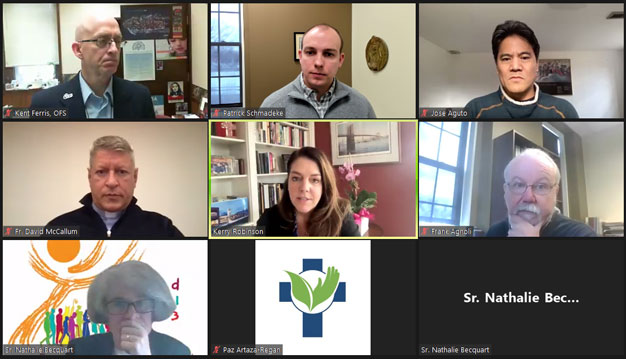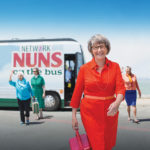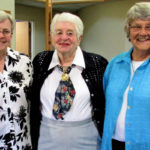
Kent Ferris, Patrick Schmadeke and Deacon Frank Agnoli of the Diocese of Davenport, spoke at a nationwide online conference titled “Together in the Journey: The Synod, the Laudato Si Action Platform and the Eucharistic Revival.”
By Barb Arland-Fye
The Catholic Messenger
Three Chancery staffers described a dilemma that the Diocese of Davenport faced: the overlapping of three major initiatives of the Catholic Church, each meriting equal attention. The diocese took a synergetic approach that earned the praise of participants in the Catholic Climate Covenant’s webinar “Together in the Journey: The Synod, the Laudato Si Action Platform, and the Eucharistic Revival.”
Webinar organizers invited diocesan staffers, Kent Ferris, director of Social Action; Patrick Schmadeke, director of Evangelization; and Deacon Frank Agnoli, director of Liturgy and of Deacon Formation, to present the Davenport Diocese’s approach during the Feb. 10 webinar. They joined three other distinguished presenters — two who work directly on the Synod and a third who leads an organization collaborating with the U.S. bishops and the Vatican on the Synod. The webinar drew 468 participants “in person,” mostly from the U.S. and Canada.
A brief backstory sets the stage. Last fall, the Vatican officially launched the Laudato Si’ Action Platform, a seven-year initiative aimed at sustainability in the spirit of integral ecology. Shortly afterwards, Pope Francis opened Synod 2021-2023, inviting “the whole Church on a two-year journey of reflection and sharing of the whole Church.” The word “synod” means to “journey together.” Meanwhile, the U.S. Conference of Catholic Bishops approved a Eucharistic Revival initiative that begins this summer and concludes in 2024.
The confluence of these initiatives provided the impetus for the webinar and the selection of presenters who “have some much needed wisdom to impart to us in the U.S. Catholic community,” said Jose Aguto, executive director of the Catholic Climate Covenant.
Initiatives nurture each other
“I think there is something special about this invitation to us to address the relationship between Synodality, Laudato Si’ and this call to a deeper participation in the eucharistic celebration,” said Father David McCallum, S.J., who serves on an international commission responsible for supporting the Synod process over the next two years. “These three initiatives are not separated but they are deeply integral to one another. They fertilize, enhance and nurture each other. Our desire today is to really establish the connections between them.”
Communion, participation and mission — the three key words for the Synod — deepen the connection between Synodality, Laudato Si’ and the Eucharist, said Xavière Missionary Sister Nathalie Becquart, undersecretary of the Synod of Bishops. “The vision of a Synodal Church is truly rooted in the mystery of the Trinity and in the Eucharist.” The Synod opens and closes with the Eucharist, she noted. “We are called to be on this journey as a eucharistic journey.”
“What is deepest in our hearts has a chance to be voiced and shared,” said Kerry Robinson, executive partner with the Leadership Roundtable. She spoke of the great opportunity to speak in candor and charity and for the ordained, religious and lay people to work in partnership for the sake of the mission of the Church. “We absolutely need the diversity of perspectives and experiences to be better informed, to be healthy, to be whole.”
As news of the Synod and its timeline broke, “We were already looking ahead to the Laudato Si’ Action Platform and we knew that the Eucharistic Revival was in the works. As a first step, we began to set up a timeline,” Deacon Agnoli said. “It’s a living document. We keep adding more to it as these journeys unfold.”
He said Bishop Thomas Zinkula saw the combined timeline as “a golden opportunity to be intentional about taking a truly integrated approach to ministry in the diocese — with the ultimate end being evangelization, inviting people into a living relationship with Christ.”
Crafting the question
Schmadeke shared the diocese’s two-pronged approach to the Synod — structured listening sessions and more intimate, one-on-one conversations. The latter, called the 58,000 Cups of Coffee initiative, has gained national attention for its creativity, simplicity and practicality.
The diocese adapted the overarching question the Synod poses in order to offer the “same question at all listening sessions, whether in a parish or a homeless shelter. We realized that we needed to translate this question into everyday language,” Schmadeke said.
He thanked Sister Becquart and Robinson for the inspiration they provided in a previous webinar on the Synod. That led him to help shape this question: Based on your personal experience, what fills your heart and what breaks your heart about the Catholic Church (e.g., in your parish and beyond your parish)?
Eucharistic Revival
Deacon Agnoli, addressing the diocese’s approach to the Eucharistic Revival initiative, said, “The revival speaks of grassroots involvement, being enriched by the Eucharistic traditions of the diverse communities that make up the American Catholic Church. No one is to be left behind. The revival is meant to reach every household — including households of one.”
He referenced Pope Emeritus Benedict XVI, who “insisted that liturgy — whether the Mass or eucharistic adoration — must always move us outward.” Thus, the Davenport Diocese’s eucharistic procession on June 19, for the Solemnity of the Most Holy Body and Blood of Christ, will travel through some of the more economically stressed neighborhoods in Davenport. Participants will walk from Sacred Heart Cathedral to St. Anthony Church in Davenport.
St. Anthony operates a ministry dedicated to feeding persons experiencing homelessness or struggling to make ends meet. “Might we, in the procession, carry not only the Bread of Life — but bread itself, that the parish will use so that those in need might have life?” the deacon asked. “And might we not invite those served by this ministry to join us for the closing rites and refreshments afterwards?”
Cry of the Earth
Ferris spoke about the diocese’s approach to Laudato Si’ and the collaborative efforts with organizations outside the diocese, such as the Iowa chapter of Interfaith Power & Light. “We worked with them on a press conference with the launch of the encyclical in 2015 and are now undertaking Farm, Faith and Climate conversations in rural Iowa. We have also benefited from our working relationship with In Solidarity, which has served to help two conversations about faith and business over the past several years.”
He credited the support of Bishop Zinkula and his predecessor, Bishop Martin Amos, for making it possible to develop an action plan. “In Laudato Si’, Pope Francis describes the Eucharist as an act of cosmic love, adding ‘even when it is celebrated on the humble altar of a country church.’ It is an image we will use as we engage with and learn from Catholics in rural settings this year,” Ferris said.
He shared how Bishop Zinkula described the Synod process to Protestant ministers gathered recently in a rural parish. The bishop mentioned that, in addition to listening to Catholics and others, the diocese’s Evangelization director had suggested listening to the cry of the Earth.
Ferris spoke about a reference in the Laudato Si’ encyclical to “become painfully aware of what is happening in the world so that it comes into our own personal suffering, something like what our local moral theologian, Father Robert Grant, refers to as redistributive suffering. This is only possible by listening, truly listening to the other, our neighbors and the created world.”
He said the diocese’s development of its Laudato Si’ Action Plan is slightly behind the other two initiatives, “but attention to listening, which is so important to the Synod process and a greater appreciation of the Eucharist, only stand to benefit what we ultimately develop as a seven-year plan for caring for our common home.”
(Editor’s note: View the webinar at https://tinyurl. com/2p8wyp78)











